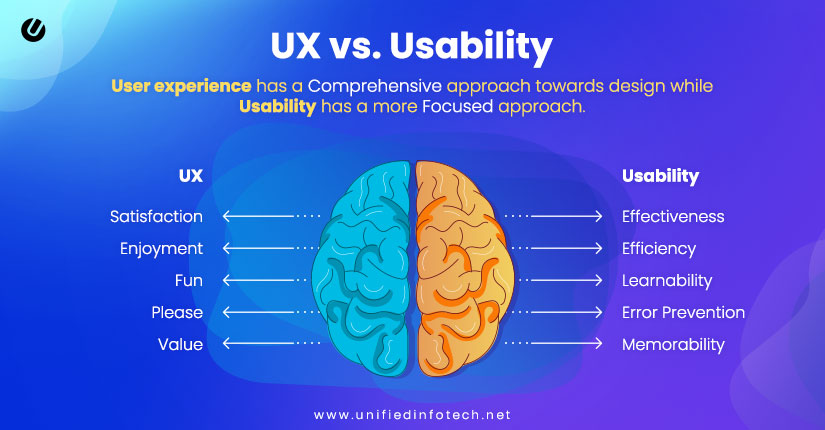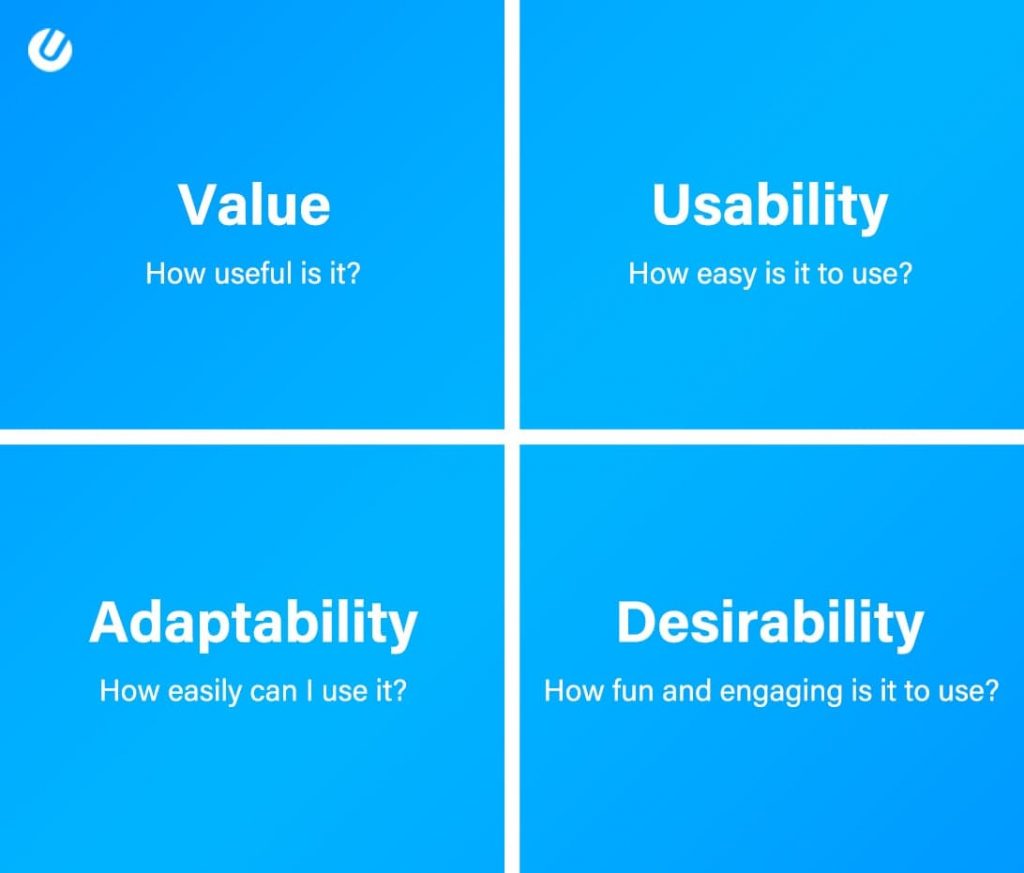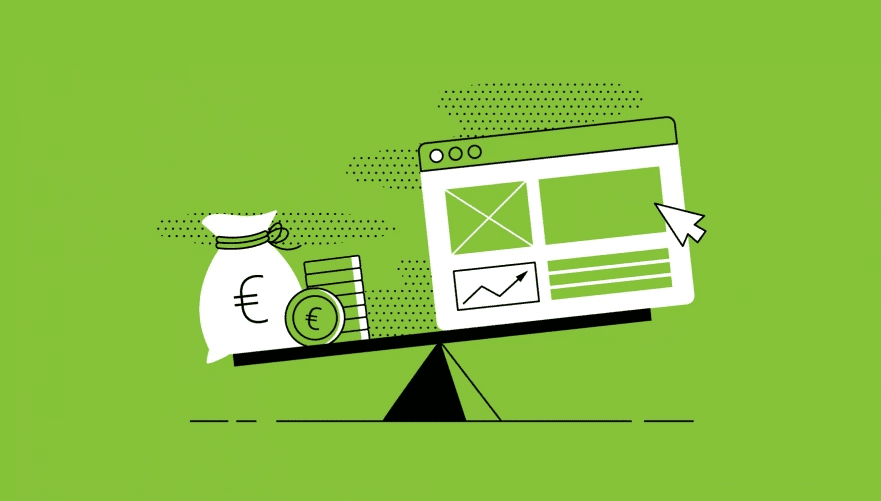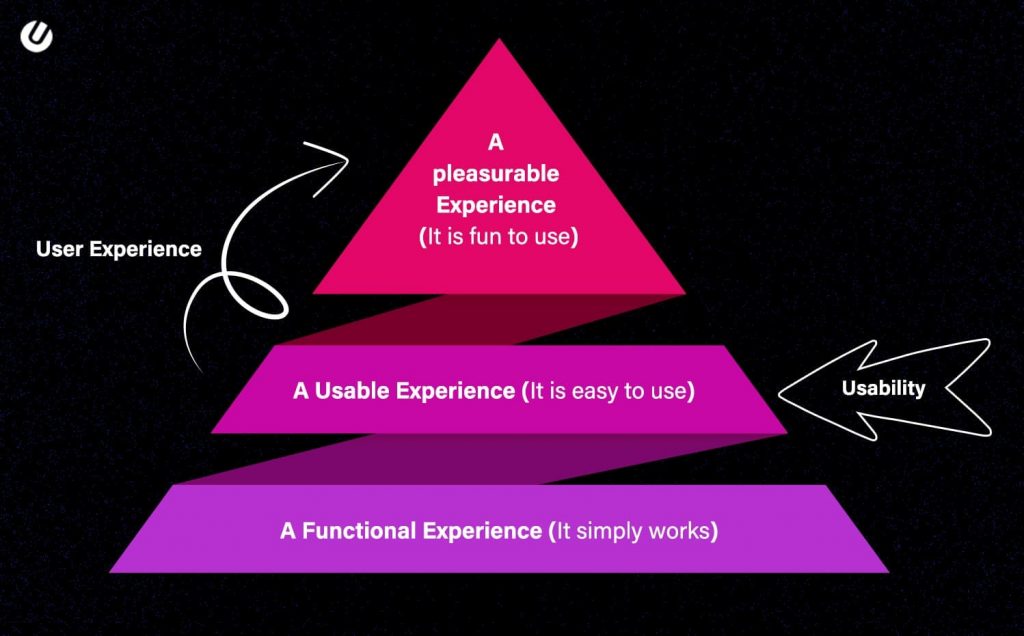Unlock Expert Advice with Zero Commitment.
We’ve Eliminated the Barriers.

The terms Usability and UX were used synonymously for years. And you are probably using it that way as well.
But what if I tell you they are not the same?
What if I tell you that usability is in fact a tiny portion of UX? Will you be surprised? Or downright outraged?
Whatever you may feel like, it’s true. Usability and UX may be related, but they are not the same. And if you still feel like – “wait, this can’t be right!!” then read on cause I have more details on it.
When it comes to a discussion such as this, it’s always a good idea to start with a look into the definitions, and that’s exactly what we are about to do.
According to Nielsen Norman Group, the definitions of UX stands something like this-
“User experience encompasses all aspects of the end-users interaction with the company, its services, and its products.”
On the other hand, the International Organization For Standardization defines usability like this-
“The extent to which a system, product, or service can be used by specified users to achieve specified goals with effectiveness, efficiency, and satisfaction in a specified context of the use.”
Do you see the difference?
If you don’t then allow me. The user experience definition speaks of “end user’s interaction with the company, its services, and its products.” This means it encompasses everything the user may have encountered while interacting with the company, in this case, the website. It is the design, functionality, ease of use, everything.

Usability principles on the other hand are all about a system or a product that can be “used by a specific user to achieve specific goals in specific circumstances with ease and efficiency.”
It means that usability at its basic is different for every product and it can change based on the user, the circumstances, and the task the user wants to complete. In the end, usability seems to be a more fluid concept than UX.
Before we get into the discussion on why Usability is a part of UX and not enough on its own, let’s talk about how they both share an interdependent relationship.
If you conduct proper usability research, you will see that it enhances the overall experience. Imagine a site that is glamorous with its beautiful design, amazing with its font.
Let’s just go ahead and say it dazzles you. But that’s about it. When it comes to looking for the simple search button, you can’t find it.
Instead, every time you move your mouse pointer, you are bombarded with music, animation, and images.
And when you can’t find the simple search button, it won’t feel that glamorous anymore.

And that’s where web usability comes from. It reins in the glamor of the website and makes sure that the user does not get lost in the glitz of the design and can actually perform the task they came to the website for. After all, even though the users want to be entertained, they want their job done first.
It is easy to get crazy with the design of a site, considering the new kinds of trends rolling in every day. What usability does is reins in the design aspect, and introduces efficiency while performing tasks on the site. It ensures the effectiveness of the design and ensures that the user can complete tasks with minimal problems. And this is the reason why most user experience design firms believe in having a perfect balance between usability and user experience.
But even though Usability is important for the UX of a website, it is not the be-all and end-all. Let’s see why website usability is not enough on its own and is a part of user experience design.
Think about the most unattractive pair of trousers.
Have you? Good. Now think about why the trousers are unattractive. I mean there are no reasons, after all, these are simple trousers that do the job, which is to cover the body. But still, you are not happy with them.
Why is that?
Because when it comes to human satisfaction, usability is not enough on its own. A simple user interface design, created with only usability in mind would not make the users happy.
The site has to entertain users while completing the tasks. And that is why other elements of UX are required.
User experience is made up of four aspects of design- value adaptability, desirability, and usability.
We have already defined usability, now let’s analyze the three other elements and discover why they are equally important.

When it comes to business success, usability is not enough. And that’s why value is a critical element important for building a better user experience.
The value of a product, a site, in this case, depends on how well its features and functionalities are aligned with the user’s needs. Here’s an example to make things clear-
Think about the disparity in popularity between desktops and laptops. There’s no doubt that laptops are more in vogue, although desktops are still good enough to complete our goals. Why is that?
Because laptops provide more value for us. Its functionalities are aligned with our need to be connected on the go every day. As a result, the users clearly value a laptop more than a desktop.

Source: Semrush.com
However, the value of a product is not only dependent on the surface level needs of the users- a.k.a the needs the user is aware of. A website can only offer real value to its user if it fulfills the needs that exist beneath the surface level, i.e the implicit needs that even the user is not aware of.
The product suggestion option on any shopping site can be pointed out as an excellent example of site value. It shows the users’ products related to their searches, products they were not even aware they needed. This recommendation increases the value of the website to the users, therefore building a better user experience.
Some might argue that the element of adaptability depends on the usability factor. But that is not the case all the time.
Besides website usability, the adaptability of a website depends on many factors, such as how easy it is to access, how long it takes to complete tasks and how steep the learning curve on the website is. If a website does not have an easily accessible design layout for the user, it wouldn’t be adaptable no matter how usable it is.
However, when it comes to improving the adaptability of a site, the designers at user experience agency often depend on building robust usability, with a smooth workflow that requires as a little learning curve as possible. It depends on the intuitive design structure and adds to the user experience design. The key thing to remember here is this- adaptability of your website is going to depend on more factors than just the usability of it.
Till now we were talking about the logical and rational aspects of the UX, and now we come to the emotional aspect, also known as desirability.
The aspect of desirability is not dependent on the logical techniques of deciding, rather on how the user perceives the site. Even remarkably usable, valuable, and adaptable sites have been rejected by the users because it was not desirable enough. On the other hand, sites severely lacking in all three factors mentioned above are cherished by the users out there. And it’s all because of desirability.
Desirability first and foremost is based on the user interface design. Keeping up with the user needs, you have to make the design of the site pleasing. The key here is the balance between usability and design, as we have already talked about it before.
The desirability is, however, not just about the design. Imagine a site for writers, where anyone can upload writings for free. The design of the site is good, usability is amazing, it adds value to the UX. But the cherry on the top is the fact that end users can earn money from the writings. This small feature will make the whole site and engaging with it more desirable than any other similar website.
Without desirability, the site is going to look bland and boring to the people. Just usability is not going to ensure a better experience user, a website also needs to be desirable to the users.
So where do the usability and UX of a website lie in the user’s hierarchy of needs?

According to the above diagram, the user’s hierarchy of needs has three levels. Functional, usable, and pleasurable. The aspect of web usability concentrates on the usable level, deciding whether the site is usable by the visitors and if they can complete their tasks in an efficient manner.
User experience design, on the other hand, focuses on both the usable and the pleasurable parts of the website design. It depends on both the efficiency of the website and its ability to complete a task, as well as making the entire process pleasurable. According to this method, usability happens to be a part of the user experience design process and not a standalone aspect of website design.
At the end of the entire discussion, we can say that usability is not enough to make a website succeed and that’s why it serves as a part of UX. But is that reason enough?
Let’s see what will happen if your website’s design was based only on the usability aspect and nothing else-
Simple usability is not enough for your brand identity. Sure it can be a part of it. But on its own, it can not be treated as an identity for a business.
The website’s user interface design works as an outlet for the organization to express its brand and what it believes in. This is done through the images, language, videos, and audios, everything. And it proves that without these elements, simple usability is not going to help to build a brand.
Given the choice between grilled cheese sandwich and bland porridge as a snack for 7 days, which one do you think the majority will want?
When given this choice, the majority would pick the grilled cheese sandwich. And that speaks a lot about the relationship between customers and user experience. Just fulfilling their requirements is not going to be enough. They need their soul to be satisfied as well. And that satisfaction can not be delivered by simple usability. And that’s why it needs to be used as a part of the user experience design.
In their regular lives, customers are not engaged by the simple usability, rather interesting, entertaining, and engaging interaction.
All this is delivered through the design part of the project, not just the usability. Sure you will be able to make things easier for the visitors, but human psychology is not attracted to easy things only. They want to be interested, amazed and dazzled. And that’s why you can not only apply the usability factor to your website and call it a day. For a great user experience, you need other elements of UX as well. We as a leading web development and designing company in New York, make sure you don’t miss out on anything.
This might seem like a long discussion to only talk about why usability is a part of user experience, but trust me, it is important.
The main danger lies in the fact that many user experience consultants use these terms synonymously. And that frequently hinders the web development projects and ultimately costs loads of money as redesign costs. Usability at the end of the day is merely a part of the user experience design, enhancing the experience of the website visitors. On its own, it does not have enough power to drive up business success.
Want to know more about UX, website usability testing, and how to make the most of it? Why not contact us? We can assist in understanding and applying these elements to the site design to make it successful.
We’ve Eliminated the Barriers.
We stand by our work, and you will too.